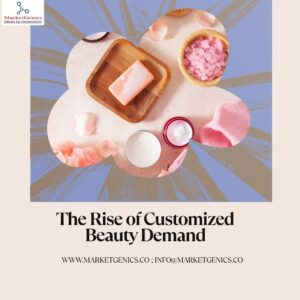The Rise of Customized Beauty: Consumer Demand for Personalized Skincare and Makeup
The Emergence of Personalized Beauty: The Consumer’s Dictum for Skincare and Makeup
Introduction
The personalized beauty business has become a dominant trend in the recent years and is changing the ways in which beauty brands formulate, market, and provide skincare and makeup products. Customers are becoming choosier when it comes to personalizing the way they use specific products by individually fitting their unique skin tones, skin types, and potential preferences. The push towards this trend is the improvements in AI diagnostics, data analysis, and biotechnology innovating technologies to make processing data more convenient, efficient, and less costly in terms of time and funds spent. Let us find out MarketGenics' analysis on the industry in depth.
The global personalized beauty market has been estimated at roughly USD 38 billion in 2024 and is projected to grow at the rate of approximately 12.5% CAGR during 2025-2030 owing to a growing demand by the Gen Z and Millennials who prioritize personalization and inclusiveness as well as taking care of skin health.
According to MarketGenics, in 2024 the global personalized beauty market was estimated at about USD 38 billion and will potentially grow at around 12.5 per cent CAGR in the period 2025-2030, as Gen Z and Millennials increasingly turn towards personalization, inclusivity, and skin health seen as priorities

Challenges
- Ingredient Sourcing & Inventory Management:
- Manufacturers find it difficult to hold large stocks of different materials in case different formulations are ordered.
- How MarketGenics aids: Analytics of ingredient demand trend, optimization of procurement, and removal of standing inventory.
- Regional Regulatory Compliance
- Cosmetic regulations in each country are lengthy to work through.
- How MarketGenics can assist: Provides instant regulatory coverage and compliance reports specialised to each target market.
- Scalability in Production processes and streamlining of workflows
- Small-batch production is flexible, but customized, and this is not easy to scale without compromising the quality and efficiency.
- What MarketGenics can help: It offers optimization methods of the working process with automation methods and AI-driven production patterns.
- Flexible Packaging & Logistics
- Flexible packaging schemes are required in products that are personalized, adding complexity and cost of the operations.
- How MarketGenics can help: Offers trends in packaging behaviours region-wise and logistics optimization strategies to facilitate the ease of delivery.
- Fragmentation in Supply Chain
- The gradual globalization of the supply lines includes raw materials sourced worldwide that leads to disjointed complex chains that can be delayed.
- How MarketGenics helps: Conducts local vendor research that can help brands to build viable and reliable networks of vendors.
- The Stability of Products with Capabilities to Adjust to Different Climates
- Personalized formulations fail to remain active with change in temperatures and humidity.
- How MarketGenics can help: Performs product stability studies in the region to ensure consistency of quality on all climates.
- Fast Product Cycles
- Very rapidly moving consumer tastes magnify the pressures put on R&D teams with the demands of the fast-moving innovation cycles.
- How MarketGenics helps: Has the capability to provide ingredient demand modelling and trend forecasting to accelerate product development.
What Is Propelling the Personalized Beauty Boom?
1.Stronger Knowledge among the Consumers about Skin Health
The growing consumer awareness about ingredients/formulas and skin care procedures is generating an unprecedented demand of products that target specific skin problems: pigmentation, acne, or aging ones.
2. Implementing Technology
Skin diagnostics, virtual consultations, AI-based skin analysis of DNA is performed to prescribe hyper-personalized product regimes to companies.
3. Multiple Beauty Standards
There has been increased need to create shade inclusivity in makeup and bespoke formulations in skincare further fuelled by social media trends which have encouraged people to focus on authenticity and diversity.
4. Manufacturing On-Demand
The small batch, on-demand production models employed are now helping to drive customization platforms because they reduce the amount of wastage and match sustainability goals.
Worldwide Market Summary
The North American market alone was estimated to have about USD 12.3 billion in the global customized beauty segment by the year 2024, according to MarketGenics.
There is a rapidly growing trend of DNA-based and microbiome skincare solutions in Europe, especially in Germany and France.
In Asia-pacific, South Korea and Japan are focusing on integration of traditional ingredients with modern algorithmic personalization in an effort to attract local and global audiences.
The Middle Eastern markets are increasingly taking an interest in customised formulations to suit hot and dry climates.
Future of Personalized Beauty
- AI Powered personalisation engine: Expect more skincare companies to use AI- based recommendation engines based on consumer insights.
- Integration of Wearables and IoT Devices: Wearables will keep a tab on skin health and relay the data to brands to come up with even more personalized formulations.
- Sustainability & Zero-Waste Formulas: Personalized beauty lends itself intrinsically to sustainable manufacturing because we only manufacture what is wanted.
- The DNA of Skincare: DNA based products will become global with a wider appeal to skincare products, notably in the luxury segment.
- Metaverse Effect on Beauty Trade: Virtual avatars with life-like skin coloring will allow consumers to see the products impact before making purchase.
Conclusion
Personalized beauty is emerging as a new business model in the worldwide cosmetics market, and personalization is the driving force behind consumer product selections of skincare and makeup products. With the changing technologies and consumer preferences, businesses that have the capability of providing personalized, effective and regulatory midst solutions are the companies likely to stay sustainably in the long-term.
MarketGenics provides advanced consumers intelligence and market knowledge to help the cosmetic companies align their strategies with the current trends and consumer behaviour thus verging on rapid growth of companies.
